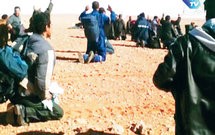 Four days after a large and seemingly well-organized group of kidnappers stormed the Tigantourine gas facility in southeastern Algeria, security forces have have ended the crisis with a final assault on the sprawling complex.
Four days after a large and seemingly well-organized group of kidnappers stormed the Tigantourine gas facility in southeastern Algeria, security forces have have ended the crisis with a final assault on the sprawling complex.
Though Algiers has demonstrated that it will deal resolutely with any attack targeting its vital interests, the ambiguous and violent events characterizing the hostage crisis have opened the government up to considerable foreign criticism at the same time that Algeria is trying to expand investment in its energy sector.
Analysis
The hostage situation at the Tigantourine gas facility began before dawn on Jan. 16 when heavily armed al Qaeda in the Islamic Maghreb militants led by Algerian Mokhtar Belmokhtar attacked a bus carrying foreign workers from the facility to the airport. There were casualties, but security forces successfully repulsed the assailants and no hostages were taken. Around 5 a.m., militants attacked the gas processing facility itself and took hundreds of hostages. The militants were specifically targeting foreign employees and released most of the Algerian employees in small groups.
On the second day of the crisis, foreign assistance including advisors and counterterrorism teams started to arrive in Algeria. Algerian forces, however, sidelined the Europeans and Americans and executed a raid to free hostages on their own. An estimated 30 hostages were reported killed in the operation. The hostage situation endured because the Algerians did not have sufficient intelligence on the location of the attackers, though they knew some militants and foreign hostages remained in a workshop deep inside the facility.
The final assault reportedly resulted in the death of the seven remaining foreign hostages and the last 11 attackers. According to Algerian state media, this last remaining pocket of resistance had taken refuge even deeper in the actual gas processing part of the facility after previous attacks by the Algerian army. In addition to threatening the lives of the hostages, the attackers also began threatening serious damage or destruction to the facility itself in an attempt to deter further assaults. During the night, the kidnappers did reportedly attempt to sabotage the facility, causing what seems to be limited damage.
Details remain unclear, but just after midday the attackers purportedly crossed a tactical redline, and possibly began executing the hostages. This prompted the final assault by Algerian special operations forces, which had been spearheading most of the fight over the last four days. Regardless of who moved first, the result was the death of all remaining attackers and hostages. The militants reported the nationalities of these hostages as three Belgians, two Americans, one Japanese citizen and one British citizen. These nationalities have not yet been confirmed.
The Tigantourine gas facility hostage crisis is the worst security event Algeria has faced in recent years and has been characterized by ambiguous reports and uncertainty. The duration of the assault phase of the crisis is also notable. The large facility, the lack of situational awareness, the high number of hostages and kidnappers and the kidnappers' willingness to use deadly force ensured a complicated and ultimately violent operation.
Algeria is operating under its own political strategies that could prioritize the quick resolution of the situation over the absolute safety of the hostages. This is depicted in Algeria's adamant refusal to negotiate with the kidnappers or to accept British and U.S. offers to send their own foreign hostage rescue teams. Algerian media reported that the government ordered the assault 12 hours after the terrorists attacked the facility -- demonstrating to all onlookers that this would be their only response.
However, Algeria's political calculations when dealing quickly and resolutely with the hostage-takers have left Algiers open to criticism and raised doubts about the security of its energy sector. Multiple foreign governments who had their citizens taken hostage in the facility have already decried Algeria's lack of consultation or cooperation in keeping them informed on the evolving situation.
Ultimately, Belmokhtar's group has failed in its attempt to exchange the hostages for a ransom, in exchange for jailed terrorists or to use them as pawns to negotiate over the intervention in Mali. The complicated hostage crisis has however tarnished Algeria's most strategic economic sector at a time when the country needs to encourage even more foreign investment.
Courtesy : Stratfor (www.stratfor.com)